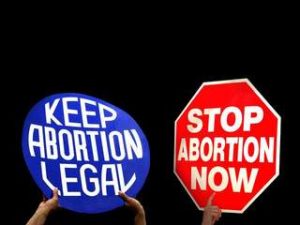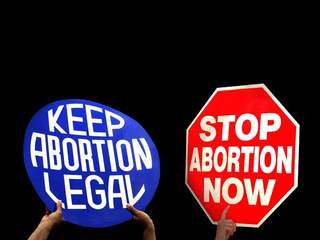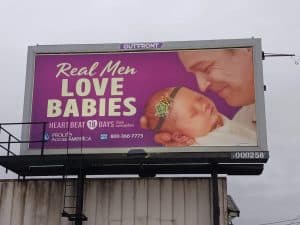 by Aly H
by Aly H
First, some housekeeping. When I say “nuanced,” I’m referring to stances on abortion that fall between the “illegal in all” or “legal under any” poles. About half of Americans reject all-or-nothing legal stances on abortion, according to a 2015 Gallup poll. And if you’re a Mormon who agrees with the Church’s position on the matter, then your views also occupy this middle space.
I recognize that there is a lot of variation to be found between the “illegal in all” or “legal under any” extremes. Still, there are a few principles that I think those with nuanced views could agree on:
1) That in at least some cases, women should have the option to access a safe and legal abortion;
2) That at least at some point in a pregnancy, a fetus has at least some rights that ought to be protected; and,
3) That at least in some cases, abortion is a morally complex issue without easy or simplistic solutions.
For the sake of brevity, then, and also because I want to be clear that I’m not suggesting that the left (or anyone, please) should hold space for the kind of hard-right “pro-life” stance that, for instance, actually cares far more about appearing righteous than they do about protecting life, I’m going to use the “nuanced views” phrase for the rest of this post.[1]
So, back to my question: What is the cost of excluding people with nuanced views on abortion—many of whom identify as pro-life—from socially progressive spaces?
This is something that has been on my mind since this very thing happened a few days before the January 21st Women’s March, when organizers went back on a decision to officially include what they called “an anti-choice organization” from the event. The organization that was publicly disinvited, New Wave Feminism, bills itself as “pro-life” and has nuanced views on abortion; and in an official statement addressing the situation, March organizers iterated that the event would be “pro-choice as clearly stated in our Unity Principles,” which (among other things) describes “open access” to abortion.
This decision on the part of the Women’s March irked me for a few reasons.
First, because (right or wrong) the Women’s March—which has been called the largest protest in U.S. history—was seen by many (supporters and opponents) as a unifying and clarifying moment for the left in a deeply divided America. Within this context, the March’s decision to make “open access” the only acceptable view predictably encouraged the kind of false but effective all-or-nothing message that angry, far-right conservativism thrives on: basically, that progressive causes are a package deal that includes a non-negotiable, hard-left view on abortion—take it or leave it.
And second, because it’s 2017, and America has a president who is openly racist and xenophobic, who is reckless and deceptive and self-obsessed and unprincipled. It’s true that many Americans (including Mormons) found all of this either attractive or overlookable. But for many, this unprecedented moment has driven us to engage and resist in unprecedented ways—whether it’s attending our first protest or making our first call to a congressional representative or simply considering certain causes and perspectives with new eyes. These shifts happening in the minds and hearts of many Americans right now are providing a defining opportunity for a left that admits that what they overlooked, ignored, and underestimated cost them the election.
For what it’s worth, the decision on the part of the Women’s March didn’t deter me from participating, mostly because the March was about many issues I care deeply about—from immigration to women’s healthcare (which involves a lot of things) to LGBTQ rights to the environment; and while I don’t agree with every moral stance taken by every one of the loudest voices of the progressive movement, it’s likewise worth noting that I stand with people every Sunday that I don’t always agree with on every moral issue, too. Lots of people who disagree with a hard-left pro-choice stance on abortion still marched. Connecting with people we share convictions with despite our disagreements has value.
At the same time, I get why many were dissuaded by the organizer’s decision to officially restrict the March’s principles to a hard-left pro-choice stance.
And on a larger (and far more consequential) scale, while I voted for Hillary Clinton in the general election, I can understand friends who feel skeptical towards and hesitant to give their full support to candidates or causes with ties to a political party that has removed the word “rare” from their discussion of the need for “safe and legal abortions.”
I’m no political analyst. But I think there’s evidence to suggest that progressives’ hard-left stance on abortion seems to be another byproduct of liberal echo-chamber oversight when polls show that not just most Americans but most people who identify as pro-choice disagree with unrestricted abortion access; when even pro-choice advocacy groups acknowledge that there is a “stark intensity gap” between self-described pro-life and pro-choice voters; and when data indicates that many progressives feel that there’s some disconnect between a hard-left pro-choice stance on abortion and other progressive views they hold. As an October 2016 Slate article described, “On issues from race to sexuality to drug law, Americans are used to seeing each new generation become more progressive than their parents; with abortion, it’s not happening.” Many who support human rights/life find consistency in the belief that “sacred personhood is worth protecting whether it’s tucked inside a womb, waiting on death row, fleeing Syria in search of a home, or playing beneath the shadow of an American drone.”
I wonder if perhaps progressives don’t realize that hard-left ultimatums on abortion don’t just offend white, evangelical, pro-birth-at-any-cost Republican voters, but many self-described pro-lifers who “are skeptical of the [pro-life] movement’s long-held ties to the GOP and the Christian right… [and who instead use] the language of feminism, human rights, and the Black Lives Matter movement to make their case for a new culture of life.”
Some have theorized that a Democratic party that already embraces measures proven to decrease rates of unwanted pregnancies and provide support to low income mothers would “be unstoppable” if they were to make space for nuanced views on abortion. For what it’s worth, as a Mormon from rural Wyoming whose Facebook friends are politically conservative with few exceptions, I see indicators that at least for many Mormons, and especially at this moment when the current administration has diverged dramatically from well-known moral positions of the Church, the left’s pro-choice stance is the last major barrier preventing many from stepping more fully into more progressive spaces.
What do you guys think? Would a willingness to make space for nuanced views on abortion do much to address the Democratic party’s dwindling numbers? Do you think significantly more Mormons would have voted for Hillary if she’d openly advocated that safe and legal abortions also be rare? Or do you sense that the association between progressive causes and a hard-left pro-choice isn’t really deterring all that many people?
[1] And just saying: unless you are actually pro-“make abortion illegal in every instance” or pro-“open access no matter what,” my take is that the “pro-choice” and “pro-life” labels are generally unhelpful descriptors that predictably invite others to get outraged/entrench/pat themselves on the back rather than engage with a complex moral issue. If you just gotta have a label, “pro-both” is a thing, I just learned.






12 Responses
I am someone who has these nuanced views… are we really only 50%? It had to be the wording of the question. I don’t know. But I do know that I am in the minority in my Mormon community. As soon as I read points 1 and 3, I shook my head and realized that, no, many of my Mormon friends, despite the church’s stance, don’t have a nuanced view. They don’t think there is ever a case for abortion. Rape and incest? Give birth and give the baby up for adoption. Fetal abnormalities? Give it the chance for a miracle. If you don’t, your faith must be lacking. Danger for the mother? Either the mother must “sacrifice” herself, or “just deliver the baby” and try for a miracle. Don’t even get me started on that last one. But I commented on a friend’s Facebook post about abortion, just popping my head in to mention these generally accepted exceptions, and got those responses. Even when I brought up the church’s stance, which most were fully aware of, they doubled down and disagreed with the church policy.
I do think the progressive movement generally has a nuanced view of abortion, but it is not represented correctly in the media or in memes and online conversations. Their views are REDUCED by others. I have been in some small circles who take a hard pro-choice approach, but those are few and far between, in my experience.
Even if you look at Clinton’s approach, she took a harder line in this election and has definitely drifted more pro-choice, but she still has obviously nuanced views. In terms of public policy, I would tend to sway toward supporting hard line pro-choice legislation, although I certainly disagree with 100% elective abortions. The reason is that it protects women and families who are in that gray area. A pro-life approach, even one that accounts for cases of rape, incest, and harm to the mother or fetus, is problematic. You can’t account for or make exceptions for every situation in the gray area. You can’t possibly imagine all the ways that a pregnancy will play out. How can you ever know (legally) if an abortion is truly elective vs. the result of rape? Will there have to be a long-drawn-out trial? A police report? Because we all know how underreported these things are. Or what if the mother’s chance of survival is not good, but still not zero? Where do you draw those lines? Does the mother have to have less than a 50% chance of survival? 70%? 30%? How can you possibly legislate with a nuanced view of abortion?
I feel like Clinton and most progressive voices take this hard line pro-choice position for the same reasons – to protect women in the gray area. And they all cheer when they see abortion rates decline (as they have been). These people are not sadistic baby-killers.
So I guess what I’m saying is that I think conservatives and liberals and progressives can individually get along in conversations about abortion if they recognize and acknowledge each other’s nuanced views. But as far as the parties? Their positions are always going to be reduced to a single talking point or sound bite, no matter how much room there is in the actual conversation for nuance. Especially in an us vs. them conversation, where we already tend to oversimplify the standpoints of the outgroup.
But I completely agree that, wherever possible, we need to make space for those with nuanced views. Even those who are 100% pro-life should not need to feel alienated when it comes to the women’s march and other women’s right, but I kind of understand why pro-life messages weren’t “allowed.” The march was about women’s rights, not fetus’s or embryo’s. I wouldn’t have a problem with a pro-life group marching, but if anti-abortion is their focus and message, how is THAT a women’s rights issue? How can that fit in with the progressive movement at all? I guess that’s why I am confused about why a pro-life group even wanted to march at all. Was it a protest in and of itself?
Lots of good points here. Some responses (that I’m writing out way past my bedtime… we’ll see if they make sense):
1) I know faithful Mormons who take a much more conservative stance on abortion than the Church does, too. And I wonder if in many cases, statements from many leaders about abortion sort of support people in taking those stances. Many of the quotes included here don’t exactly acknowledge that there are moral gray areas with abortion, for instance. (I saw this MWS article a lot on my newsfeed after the Women’s March.) http://www.mormonwomenstand.com/topics/abortion-the-mormon-perspective-on-abortion-and-human-life/
Still, I’d guess that the absolute stances you’ve described aren’t representative of how most Mormons feel (the idea that a woman who will certainly die if she attempts to carry out a pregnancy should be forced to stay pregnant is super extreme…). That guess is just based on my conversations with other Mormons, though, and also on the idea that I think most Mormons are fairly reasonable and moral people. I could be wrong on that, though.
2) In my post, I’m trying to argue that the progressive movement should openly make space for people who believe that abortion is a morally complex issue. I’m with you that creating good legislation for a morally complex issue isn’t an easy or simple undertaking, but I don’t think that the best response to that is to say that we shouldn’t therefore have these tough conversations and work to create laws that acknowledge that complexity. For instance, mandating that women seeking an abortion be given the option of an ultrasound beforehand would be a policy that I think people with nuanced views could productively debate.
3) I disagree that parties ought to or have to reduce their positions “to a single talking point or sound byte” (especially when it comes to morally complex issues), precisely because when your actual position is in fact nuanced, claiming an all-or-nothing position isn’t just inaccurate but alienating to a lot of people who otherwise might have chosen to hear you out and work alongside you. “All or nothing” isn’t doing anyone any favors ever, and in the case of abortion, if most liberals and progressives really do have nuanced views and genuinely care about rarifying abortion (like you’ve described; I hope that’s true), then they’re undermining their own goals by not doing more to make that known.
4) I also disagree with your main point in your last paragraph where you said, “If anti-abortion is their focus and message, how is THAT a women’s rights issue? How can that fit in with the progressive movement at all?”
First, I don’t know details of how the pro-life feminist group that was excluded chose to present their platform to March organizers, but their website at least spells out pretty clearly that they want to rarify abortion in ways that very much fit in with many progressive positions. E.g., they advertise an app on their website that points women to places where they can have STD screenings, get government assistance, etc., and their stated goal is “let’s work towards a culture that supports a woman so well that she never has to have one.” (I’d argue that never is probably impossible, but that’s a different discussion.)
Their only crime, then, seems to have been that they used the “pro-life” phrase and made it known that they want abortion rates to continue to decrease. That’s why the decision to exclude them concerned me so much.
If you believe that abortion is a morally complex issue—that a fetus has some rights at some point in a pregnancy, that actual immorality (I’m not talking about, like, second ear piercings here) can have a negative impact on the health of individuals and societies—AND you acknowledge that we ought to provide better support to women through things like better access to birth control and sex education, do more to help families in poverty, etc.—then I think this kind of “anti-abortion” stance absolutely should be given a place in progressive spaces.
Thanks for the detailed response, Aly! This is the kind of conversation I’ve been craving.
1) Admittedly, my sample size of Mormon’s views on abortion is quite small, mostly because no one is willing to talk about it. It seems that no one wants to be a dissenting voice in the conversation. I was dogpiled on by quite a few Mormons, and not one person stepped in to defend me or the church’s official position. But you and I both just have anecdotal evidence, and likely very different samples. I would be curious to see results from a scientific survey about this issue.
2) I completely agree with you. I’m open-minded to the idea that anti-abortion legislation can exist that also does a good job at outlining exceptions and protects mothers in extreme situations – I just haven’t seen any yet. Which is why we need to keep having these conversations. So many people are unaware just how many situations might call for an abortion, and how difficult it might be in states that have restricted, for example, all late-term abortions, or have other unnecessary/dangerous restrictions on abortion. I wish I would see more discussion about this in general!
3) I didn’t say that parties intentionally reduce their views to talking points. I’ve blamed that largely on the media and ourselves, who have such short attention spans that all we can handle are these reader’s digest, condensed versions of party views. It happens. And it’s unfortunate. And it’s probably the cause of people misunderstanding the liberal and progressive platforms on abortion. They need to do better at communicating these nuanced views, just as the media needs to do better about portraying them.
4) This was not actually a point, but rather, a sincere question from me. I have a hard time seeing how anyone who believes that a mother should sacrifice herself instead of having an abortion could possibly be championing women’s rights. And you’ve started to answer this in your response, so thanks! If all pro-life groups were equally dedicated to improving access to birth control, sex ed, and welfare programs, that would be fantastic, and we’re working toward the same goal. I hope that many of those exist. However, I know that some loud pro-life voices also, by nature of their beliefs, oppose these programs (especially super-religious, super-conservative ones). I guess that’s more who I was referring to when I questioned their place in the women’s march.
50% probably makes sense. 25% being pro-life, no abortions ever and 25% being pro-choice completely open access.
50% in the middle of a normal distribution seems a fairly good point.
The pro-life feminist group that wanted to march was not for more restrictions on abortions. They have their personal views, but realize it is ultimately between the women and God. Only God knows the full extent of the circumstance.
I feel this way, too. Yes, there may be situations in which I don’t agree with an abortion, but it’s not my choice.
The Church’s official position is to ask a local priesthood leader’s permission first. If not, you run the risk of being excommunicated.
My personal opinion would be – if I were female, which clearly I am not, and so it could be said it is easy for me to consider – that no circumstance would lead me to have an abortion. I further agree with the Church position of reasons for having an abortion.
However, these reasons only really work in a system that upholds chastity. As long as sex, with anyone (legal requirements permitting), at anytime, is within the construct of society’s morality open abortions will always be discussed as required – as a means of not having unwanted, costly, single parents.
Every single teen TV show always comes around to the youngsters having sex. They may hold off for the one, portray the sex as being within a loving relationship, etc. However, the end result is do it, and enjoy it.
I remember my eldest daughter (now 30), when she was 10 (!!!) saying that it didn’t matter if someone got pregnant because they could have an abortion (things in the UK are quite simple on that score). She was corrected, gently.
This resonated with me on a lot of levels. I was very disappointed when I read about the pro-life group being disinvited from the women’s march. I get political parties having to stick to some lines but wasn’t the point to show that we opposed trump across ideological divides? I don’t know.
I think that a group that calls itself prolife is generally thought of as the people who want to outlaw all abortion, the hard liners who want no abortion under any circumstances, even if it kills the mother—-it must be God’s will. I think if the group wanted to portray the nuanced view you are talking about, then they should not give themselves the same label as the hard liners. I do think it is possible to say we are against abortion by promoting the best proven way to reduce abortion and that is to be pro access to birth control. If the group had presented as “we want to reduce abortion by fighting for better access to birth control,” I think they would have been welcomed.
But for those of us who were alive before Roe and remember women having to prove that it was rape in court, which is near impossible to do even if the woman did file a police report at the time…for those of us who remember women having have multiple doctors testify that their life was in danger in court in order to get an abortion, for those of us who remember women dying because that court process took too long…for those of us who remember women dying because of back alley abortions…we really don’t want to go back to someone other than the mother and her doctor deciding.
I’m a feminist, and I support legal abortion. However, I am socially conservative in many ways. I find myself supporting women’s rights until I spend too much time with liberals and they drive me crazy with their insistence on people needing to be completely progressive in all areas or you are a horrible person.
The march was a perfect example. Why couldn’t the feminists of the march see that that Pro-life group probably had a lot of the same reasons to worry about Trump, even if abortion was one thing that they had a different stance on?
We are all individuals. I can be very feminist on consent issues, legal abortion, domestic violence, workplace harassment, birth control insurance coverage, etc. But have non-progressive point of view on transgender bathroom choice or immigration. I want other feminists to be nice to me and see what we have in common! (especially when feminism is part of what drives my stance of bathroom access and immigration policies).
Great post, Aly. I consider myself pro choice, but I have nuanced views on abortion. And I absolutely think the Democratic party and/or progressives should make explicit room for people with those nuanced views. I really liked the “safe, legal, and rare” description.
Just a quick question: You say the pro-life feminist group that was excluded as being sponsors for the march had nuanced views on abortion. I read their “About” page and I don’t see them creating room for abortion in any situation at all. Or did I read them wrong? Why do you see this group as having nuanced views on abortion? Is it because they acknowledge complexity?
Hey Caroline, I threw them into the “nuanced views” definition I described at the beginning of my post in mind (which is based on feelings about legality). They fit in with #2, I think, because they explicitly state that they “don’t work to make abortion illegal.” They admit that abortion is a “tricky” subject, and say that they want to decrease abortion by “getting to the root of the need for it.” https://www.newwavefeminists.com/about
(Which, I think, works with point #3.) Who should be considered as having nuanced views is debatable, obviously–I realize my definition was really broad. But I think they fit into the definition I’ve given. What do you think?